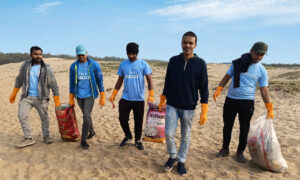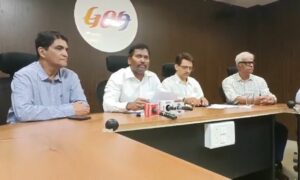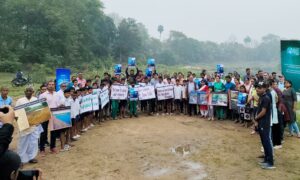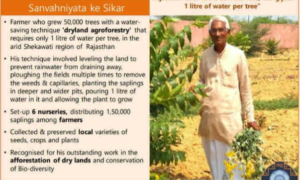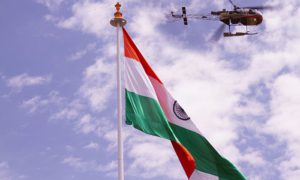Chronic Disasters, Covid 19 and Child Rights

Debilitating ecological zone affects the food security and creates a malnourished body and mind that fails to take the challenges of the future.
It is not a child’s play to grow facing recurring disasters.
Children are the worst and silent victims of climate stress and frequent disasters.
Impact of climate stress on food security, water availability, loss of family incomes disturbs the social harmony and peace both at family and society level.
This has direct bearing on the lives of children growing up in those areas.
Climate hazards also pose threat for the children and they get confined to house to avoid such risks.
The incidents of lightning strikes while children playing outdoor and the fatal events have been reported many times.
The heat waves also bring shorter school days and children are forced to stay at home.
All this affects the childhood of children in a disaster prone area.
Debilitating ecological zone affects the food security and creates a malnourished body and mind that fails to take the challenges of the future.
Food production gets affected and the families loose various livelihood options. This affects the quantity and quality of food available at the family level.
Malnourishment affects children’s cognitive development and immunity and hence restricts their future prospects of growth.
Climate change affects the children in a very silent way.
The investment in their capacity building initiatives get eroded because of the reduced family income.
It erodes the capacity of the eco system and ultimately destabilizes the confidence and happiness of the family.
It restricts their free movement and access to various services that supports their livelihood.
This gets further accelerated, when the society faces chronic disasters at regular intervals.
Geographic location of Odisha makes it vulnerable to multiple natural disasters that has been further accelerated by the climate change.
New dimensions of climate hazards are experienced at regular intervals and some of these are lightning, increased storm surge, forest fire, new varieties of pest attack and others making it harder for the people engaged in the primary sector to earn their livelihood.
Historically the state used to be very vulnerable to flood and drought condition because of its underdeveloped water management system.
Any irregularities in the monsoon rain creates sufferings for the people that they are used to over the period of time.
Further to this, the state is also experiencing cyclones at regular intervals because of its long denuded mangrove coastline.
The two major cyclone that people have experienced are 1971 and 1999 super cyclones.
In the recent history the infamous 1999 Super Cyclone not only caused more than ten thousand deaths but also brought sever damage to the property, infrastructure, agriculture and vegetative coverage of the state along with making a grinding halt to the confidence of the local people.
Jagatsinghpur, my home town being the eye of the cyclone, was ravaged by the Super Cyclone.
I grew up listening to those horrifying stories of high wind speed, storm surge up to 30feet height sea water incursion, deaths and helplessness.
In the post-Super Cyclone years the understanding of the governance system about the relevance of preparedness in disaster management has drastically reduced the number of causalities during subsequent cyclonic events.
The Chief Minister of Odisha laid the foundation of mission “Zero Casualty at Any Cost” at the time of cyclone Phalin-2013, created an euphoria of evacuation drive among officials and were successful in evacuating close to two million population in forty-eight hours.
High preparedness activity on the part of government managed to restrict the death toll to single digit only despite of high wind speed of up to 230kmph.
This attempt acclaims the state of Odisha with many appreciations at various fora. .
The same story of evacuation drive got repeated in the Cyclone Hudhud 2014, Cyclone Titili 2018, Cyclone Bulbul 2018 and Cyclone Fani 2019.
When the state of Odisha was making an attempt to facilitate economic development along with natural disasters, the advent of Covid 19 brings a complete new dimensions of vulnerabilities, which people and the state administration were not aware of and had no clues to address it.
Around the end of the year 2019, world saw an emergence of a virus, unique in its character, travelled the world within a very short span of time.
In a period of two months since the first spotting of the infected victim, millions of people across the globe got infected by the virus.
Looking at the scale of spread over geographical region along with the terrifying symptoms of the infection, World Health Organisation (WHO) declared the incident as pandemic on 11th March 2020.
The corona virus belongs to a group of virus that causes diseases in mammals and birds. In humans and birds the virus cause respiratory tract infections that range from mild to lethal.
Mild illness in human includes common cold while lethal varieties mostly attack the respiratory system of the body and within few days of infection the body succumbs due to deficiency of oxygen.
The peculiar characteristic of the virus is that it remains in the host body for almost fourteen days and after that it dies its own death.
In order to win the war against the virus either the victim should have a robust immune system or should have secondary supply of oxygen along with immunity booster medication.
The virus enters into human body via nose and mouth openings.
In the initial days, the victims shows no sign of infection but within three to four days if remain untreated the virus becomes acute and affects the lungs along with secondary ailments.
Even in the dormant state the virus has the potential to infect another healthy body.
The easy way to deal with the virus is to maintain “physical distancing” from other individuals, wearing masks and maintain cleanliness along with washing hands frequently.
This measure is appropriate at the individual level but looking at the speed of the spread of the virus, the government needs to have measures to deal with the public health.
In this regard certain decisions were taken at the government level that had long term implication on the future of the children.
Especially the decision of shut down, lock down and on-line academic classes had detrimental effect on the health and future prospect of the children.
Dealing with the Spread of Epidemic:
In the post-super cyclone years, the Odisha State Government had invested in building the capacity of the community members in collaboration with UNDP (United Nations Development Programme) and many international and local non[ governmental organizations (NGOs).
In the advent of any emergency situation the state government’s first priority becomes prevention, which they followed in March, 2020 also to save the lives of the people.
With the increasing number of corona patients in the country, the state government declared shut down of schools as a preventive measure to check the spread among the children.
Then on 21st March 2020, the state government declared partial lockdown of the twin cities (Cuttack and Bhubaneswar) along with the industrial hubs of the state to incorporate social distancing measures as a remedy to arrest the growth of corona patient.
Simultaneously an epidemic management and communication team was formed under the leadership of chief minister himself to have control over the extra ordinary emergency situation.
The mission statement of the state of Odisha was “Each and Every Life in the State is Precious- and we will attempt every possible actions to safeguard the interest of our four corer family members.”
Massive awareness campaign with regard to prevention and precautionary measure were carried out via electronic, social and print media. Frequent appeal by the chief minister referring to ladies and children brought a sense of belongingness and ownership among these otherwise left out group in decision making process.
Listening to Mr. Subroto Bagchi was like wonderful story sessions, which kept all of us informed and helped us to cooperate with our family members.
Similarly during the second wave, when there were reports of shortage of oxygen in hospitals, the Chief Minister of Odisha once again came up with another mission of “ Fighting the crisis together : Mission Oxygen” and were able to provide to various hospitals in many states.
The government of Odisha formed a special team and green corridor for loading and transportation of the life-saving gas to states facing deficit.
The inter-state collaboration and the readiness of the government of Odisha to provide oxygen saved the lives of millions in India.
The readiness of the corporate houses in this regard is praiseworthy and many steel making companies like Tata Steel and others came forward to provide oxygen to various states across India.
The state of Odisha has demonstrated its leadership in managing disasters and especially saving the lives of the millions at the time of crisis by making the communities as first responders.
The active communication of the state with the people gives lot of confidence that we can overcome any crisis, if we act together.
This also creates an environment to promote “Compassionate Governance” where the difficulties and hardships of the people becomes the foundation of response and policy initiatives.
This makes us feel confident that the state will surely build a positive environment for the children.
Further to this, children should not become only passive recipient of support and must participate in the decision making process.
The theme of 2021 World Children’s Day is, “Investing in our future means investing in our children” and on this day of 20th November 2021 we must take the pledge to create positive environment for the children and build their capacities so that they become active participants in all decisions taken in the state of Odisha, that affects the lives of the children.
Aditya Anurag Nanda
First Year, National Law University Odisha

